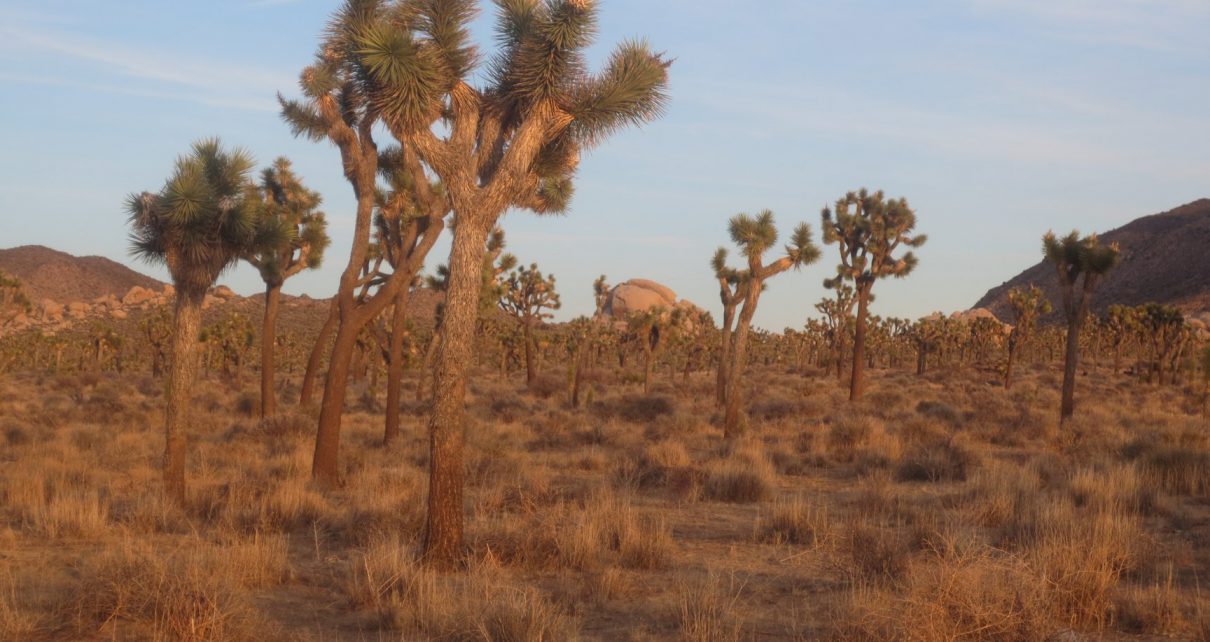
Joshua trees in Joshua Tree National Park. (Photo: Evan Symon for California Globe)
California Fish and Game Commission Delays Decision on Joshua Tree Protections
Decision over whether to make Joshua trees a protected species to be decided in October
By Evan Symon, June 17, 2022 2:30 am
The California Fish and Game Commission failed to come to an agreement on Thursday on whether or not to list the Joshua tree as a threatened species, delaying a vote over the matter until October.
For years, the Joshua tree has been in the middle of debates ranging from renewable energy, climate change, developments in the desert, water conservation and others. Arborists and other scientists have noted specifically that, due to habitat loss caused by climate change and human developments, the tree may be extinct or nearly extinct by 2100. This has spurred a range attempts to protect the tree, with mixed results.
Federally, an attempt in 2019 to list the tree as an endangered species fell through, although future attempts may come back soon. At the state level, the FGC granted endangered species protections for the tree in 2020 for one year. The action pumped the brakes on dozens of developments on private land in San Bernardino County alone, with the growing town of Joshua Tree stunted in the middle of the COVID-19 pandemic. Further city restrictions on Joshua tree removal throughout the county have also been passed, with the County itself recently installing $20,000 fines and six months in jail for third offenses.
However, with the Joshua Tree coming up as a threatened species, making it very difficult to remove them even on private property, the FGC this week was more reserved than they were in 2020. While FGC commissioners agreed that climate change and hotter temperatures, such as those seen during the current mega drought, are currently putting the trees in danger, they could not agree on what to do.
Blurring the matter was an April 2022 Department of Fish and Wildlife (DFW) report that recommended against listing the Joshua tree as threatened because the tree is currently “widespread and abundant”, but will still need to be watched due to climate change.
“The question is not, ‘Will climate change be bad for Joshua tree?’ The question is, ‘How bad will it be, and how quickly?’ And the truth is we don’t know yet,” said DFW representative Jeb McKay Bjerke to the Commission on Wednesday.
Others agreed with the DFW, as well as with many development executives who pointed out that renewable energy developments on some of these lands could help reduce the effects of climate change and help save the tree, with many cities making large-scale protections on their own under no federal or state direction.
Polarization over protecting Joshua Trees
The back and forth continued to divide the hour-member FGC commission on Thursday, ultimately putting off a vote until October. For the time, trees will be under conditional protection, with the DFW to draw up a conservation plan should the trees not get permanent protections later this year.
The decision left those on both sides of the debate disappointed, with many developers and city officials upset that projects will have to continue to be delayed due to the trees having temporary protection again, and environmentalists and conservationists upset at not having the tree be given official long-term state protection.
“If we made a decision to allow redwoods and sequoias to be cut down, people would be up in arms,” Ryan Mathis, an environmental property consultant, told the Globe on Thursday. “But Joshua trees? Apparently not so much, at least for now. A lot of people here won’t be happy until it is made illegal to remove any of the trees, just like those trees. There is nothing better for us than for developers and construction crews to head back tail between their legs and defeated.”
Others, such as Center for Biological Diversity conservation director Brendan Cummings, gave a more scientific view.
“What we have here is a very clear, undeniable threat to the Joshua trees,” noted Cummings. “We’re likely witnessing a single, large-scale mortality event right now. Obviously, it’s not the outcome I wanted – which is permanent protection for Joshua trees as a threatened species, but it’s not a bad outcome.”
Meanwhile, developers and those working to building up many areas with the trees, such as LA construction foreman Luis Gault, countered, saying that “We need renewable energy. We need affordable housing. But now we can’t build because of trees? What a world.”
The next state decision on Joshua tree protections is due next year.
- Bill to Require Law Enforcement Disclosure if AI Was Used To Help Write Reports - August 7, 2025
- Gov. Newsom Files FOIA Request To ‘Expose True Cost’ Of L.A. Federal Troop Deployment for Anti-ICE Riots - August 6, 2025
- California Redistricting: How Newsom’s Plan Will Demolish Hard Fought GOP Gains - August 6, 2025





This article, in conjunction with what Mr. Ring has illuminated regarding “abundance vs scarcity”, shows why renewables (wind and solar) should NOT be the primary source of California’s energy needs. Both wind and solar REQUIRE what natural gas and nuclear energy DO NOT require. That is, a LARGE amount of ACREAGE per megawatt of electrical output. The Joshua trees would have more than enough acreage to survive with natural gas and nuclear energy plants, that require much less acreage in generating MORE output than wind and solar. Environmental groups need to start waking up to the reality that renewables cannot deliver without destroying the natural habitat.